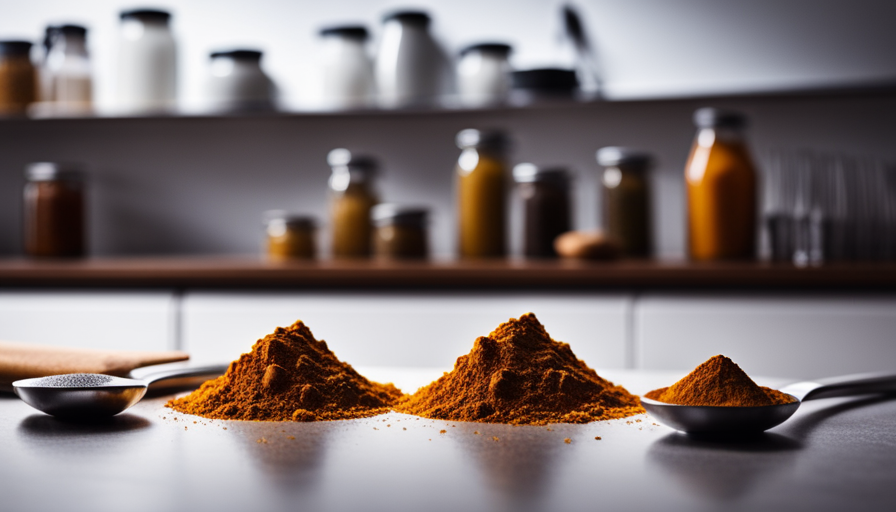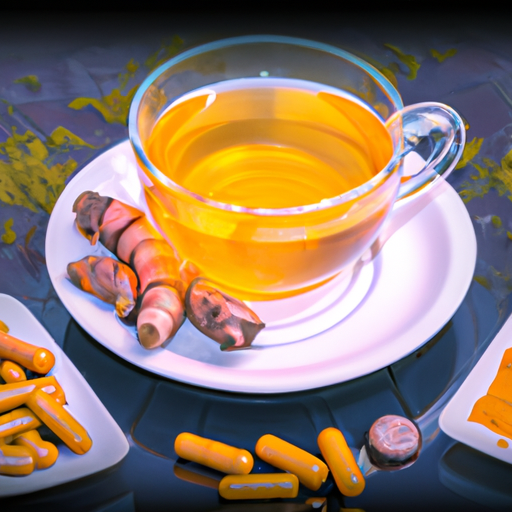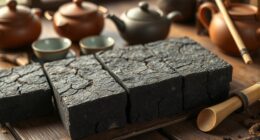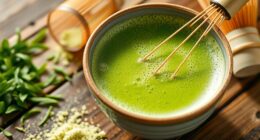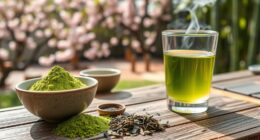Are you looking for a natural way to manage inflammation? Look no further than ginger turmeric tea. This powerful combination of spices has been used for centuries in traditional medicine to alleviate pain and reduce inflammation.
But how much ginger turmeric tea should you consume each day to reap the maximum benefits?
In this article, we will explore the recommended dosage of ginger turmeric tea for inflammation. We’ll delve into the health benefits of this potent beverage and discuss any potential risks or side effects. You’ll also learn how to make ginger turmeric tea and discover tips for incorporating it into your daily routine.
Additionally, we’ll explore other natural remedies for inflammation and provide personal experiences and testimonials from individuals who have found relief with ginger turmeric tea. Finally, we’ll delve into ongoing research and the future potential of this remarkable beverage.
So, grab your cup of ginger turmeric tea and let’s explore the healing powers of this ancient remedy together.
Key Takeaways
- Ginger turmeric tea is a natural way to manage inflammation and has been used for centuries in traditional medicine.
- The combination of ginger and turmeric in tea can help reduce inflammation in the body.
- There is no specific recommended dosage for ginger turmeric tea, but it is generally safe to consume up to 4 cups per day.
- Excessive consumption of ginger turmeric tea may cause gastrointestinal issues, and caution is advised for individuals on blood-thinning medications.
The Health Benefits of Ginger Turmeric Tea
Did you know that ginger turmeric tea is packed with amazing health benefits? Ginger and turmeric are two powerful herbs that’ve been used for centuries in traditional medicine for their anti-inflammatory and antioxidant properties. When combined in a tea, they create a potent blend that can help reduce inflammation in the body.
One of the key health benefits of ginger turmeric tea is its ability to fight inflammation. Inflammation is a natural response by the body to injury or infection, but when it becomes chronic, it can lead to various health problems, including heart disease, arthritis, and cancer. Both ginger and turmeric contain compounds called gingerols and curcuminoids, respectively, which’ve been shown to have anti-inflammatory effects.
Understanding the dosage of ginger turmeric tea is important to maximize its health benefits and minimize potential risks and side effects. While there’s no specific recommended dosage, it’s generally safe to consume up to 4 cups of ginger turmeric tea per day. However, it’s always best to start with a smaller amount and gradually increase the dosage to assess your body’s tolerance.
In the subsequent section, we’ll delve deeper into understanding the recommended dosage of ginger turmeric tea and explore any potential risks and side effects. So, let’s dive in and learn more about how much ginger turmeric tea per day is ideal for inflammation.
Understanding the Recommended Dosage
To tackle the topic of recommended dosage, start sipping a soothing and sensible serving of this potent potion. Here’s what you need to know about understanding the dosage variations and determining the ideal dosage for different individuals:
-
Body weight: The dosage of ginger turmeric tea may vary depending on your body weight. Generally, a recommended dosage is about 0.1-0.4 grams of ginger and 0.03-0.1 grams of turmeric per kilogram of body weight.
-
Health condition: The ideal dosage can also depend on the specific health condition you’re looking to address. For example, if you’re aiming to reduce inflammation, a higher dosage may be required compared to using it for general wellness purposes.
-
Sensitivity: Each individual may have a different level of sensitivity to ginger and turmeric. Starting with a lower dosage and gradually increasing it can help determine your personal tolerance and effectiveness.
-
Quality of ingredients: The potency of the tea can also vary based on the quality of ginger and turmeric used. It’s important to use fresh, high-quality ingredients to ensure maximum benefits.
Understanding the recommended dosage is crucial to ensure you’re reaping the benefits of ginger turmeric tea without overdoing it. However, it’s essential to note that individual experiences may vary, and consulting with a healthcare professional is always recommended.
Moving on to potential risks and side effects, it’s important to be aware of any possible concerns.
Potential Risks and Side Effects
Be cautious of any potential risks or side effects that may arise from consuming ginger turmeric tea, as it’s important to prioritize your well-being while enjoying this delightful concoction. While ginger and turmeric are generally safe for most people, excessive consumption may lead to certain risks and precautions. It’s crucial to be aware of these possibilities to ensure a positive experience with ginger turmeric tea.
One potential risk is that ginger turmeric tea may cause gastrointestinal issues such as stomach upset, bloating, or diarrhea, particularly when consumed in large amounts. Additionally, ginger has blood-thinning properties, so individuals on blood-thinning medications should exercise caution and consult with their healthcare provider before consuming ginger turmeric tea regularly.
Furthermore, turmeric contains a compound called curcumin, which may have mild antiplatelet effects. This means that it can potentially interfere with blood clotting if taken in high doses or combined with certain medications. It’s advisable for individuals with bleeding disorders or who are taking anticoagulant medications to consult their healthcare provider before incorporating ginger turmeric tea into their routine.
To provide a clearer understanding of the potential risks and precautions associated with ginger turmeric tea, refer to the table below:
| Potential Risk or Precaution | Explanation |
|---|---|
| Gastrointestinal Issues | Excessive consumption of ginger turmeric tea may lead to stomach upset, bloating, or diarrhea. |
| Blood-Thinning Properties | Ginger has blood-thinning properties, so caution is advised for individuals on blood-thinning medications. |
| Antiplatelet Effects of Curcumin | Turmeric contains curcumin, which may interfere with blood clotting if taken in high doses or with certain medications. |
Understanding these potential risks and precautions will help you make informed decisions about consuming ginger turmeric tea. Now, let’s explore how to make this invigorating beverage.
How to Make Ginger Turmeric Tea
Embrace the invigorating flavors and health benefits of ginger turmeric tea by following these simple steps to create your own revitalizing brew. Making ginger turmeric tea without a recipe is easy and allows you to customize the flavors to your liking.
Start by peeling and grating fresh ginger root, about 1 tablespoon per cup of tea. Next, add a teaspoon of ground turmeric to the pot or infuser. To enhance the flavor profile, consider adding other spices like cinnamon, cardamom, or black pepper. These spices not only add depth to the tea but also have their own health benefits.
Once you have your desired spices added, pour boiling water over the ginger and turmeric mixture and let it steep for about 10 minutes. Strain the tea and enjoy its vibrant golden hue and aromatic scent.
As you move forward in incorporating ginger turmeric tea into your daily routine, remember to start with small amounts and gradually increase to assess how your body responds.
Incorporating Ginger Turmeric Tea into Your Daily Routine
When it comes to incorporating ginger turmeric tea into my daily routine, I’ve found it helpful to consider a few key points.
First, I like to find the right time to drink the tea that works best for me. Whether it’s in the morning to kickstart my day or in the evening to wind down, I find that choosing a consistent time helps me stick to the habit.
Additionally, I’ve found that pairing the tea with meals or snacks can enhance the overall experience and provide additional health benefits.
And finally, making it a habit by setting a reminder or incorporating it into my daily routine has helped me ensure that I don’t forget to enjoy this healing beverage.
Finding the Right Time to Drink Tea
As I savor a steaming cup of ginger turmeric tea, I feel the warmth and comfort seep into my body, knowing that I have found the perfect time to enjoy this soothing elixir for inflammation. When it comes to finding the right time to drink tea, it’s important to consider factors such as finding the optimal brewing temperature and exploring different tea varieties. To make this process more enjoyable and relatable, I have created a table below that highlights some popular tea varieties and their optimal brewing temperatures:
| Tea Variety | Optimal Brewing Temperature |
|---|---|
| Green Tea | 160-180°F |
| Black Tea | 200-212°F |
| White Tea | 170-185°F |
| Herbal Tea | 200-212°F |
By incorporating these guidelines into my daily routine, I can fully appreciate the flavors and benefits of ginger turmeric tea. Now, let’s explore how to pair tea with meals or snacks.
Pairing Tea with Meals or Snacks
Let’s dive into the art of pairing tea with meals or snacks and discover the perfect combinations to enhance your culinary experience.
When it comes to pairing tea with desserts, there are a few key points to consider. Firstly, opt for a tea that complements the flavors of the dessert. For example, a fruity tea like hibiscus or berry blends well with a sweet and tangy pie.
Secondly, take into account the intensity of the dessert. If it’s rich and decadent, a robust black tea can balance the flavors. On the other hand, a light and delicate dessert pairs well with a mild green or white tea.
Lastly, consider the temperature of the tea. Hot tea can enhance the flavors of warm desserts, while iced tea can provide a refreshing contrast to chilled treats.
Additionally, drinking tea on an empty stomach can have its benefits, such as aiding digestion and boosting metabolism. However, it’s important to listen to your body and adjust accordingly.
As we explore the next section on making it a habit, let’s delve into the best practices for incorporating tea into your daily routine.
Making it a Habit
To make tea a regular part of your routine, try incorporating it into your morning or evening ritual for a soothing and refreshing way to start or end your day. This not only helps maximize the effectiveness of the tea in reducing inflammation, but it also ensures that you consistently consume it.
If you have a busy schedule, finding a specific time slot for your tea can be challenging. However, you can make it easier by keeping tea bags or loose tea leaves in a convenient location, such as your desk or kitchen counter. This way, you can easily brew a cup whenever you have a few minutes to spare.
By making tea a habitual part of your day, you can experience its anti-inflammatory benefits more consistently.
Now, let’s explore other natural remedies for inflammation.
Other Natural Remedies for Inflammation
Try incorporating other natural remedies into your daily routine to help reduce inflammation. While ginger turmeric tea is a powerful anti-inflammatory beverage, there are other natural remedies that can complement its effects. These alternative treatments for inflammation can provide additional relief for joint pain and support overall wellness.
One natural remedy is omega-3 fatty acids, which are found in fatty fish like salmon, mackerel, and sardines. Studies have shown that omega-3s can help reduce inflammation in the body. Another option is turmeric capsules, which contain concentrated amounts of curcumin, the active compound in turmeric. Curcumin has been shown to have potent anti-inflammatory effects.
Additionally, incorporating more fruits and vegetables into your diet can provide a wide range of anti-inflammatory compounds. Some excellent choices include berries, leafy greens, and cruciferous vegetables like broccoli and cauliflower.
To visually convey the benefits of these natural remedies, here is a table showing their anti-inflammatory properties:
| Natural Remedy | Anti-Inflammatory Properties |
|---|---|
| Omega-3 Fatty Acids | Reduce inflammation in the body |
| Turmeric Capsules | Contains curcumin, a potent anti-inflammatory compound |
| Fruits and Vegetables | Provide a wide range of anti-inflammatory compounds |
By incorporating these natural remedies into your routine along with ginger turmeric tea, you can maximize the benefits and enhance your overall well-being.
Tips for Maximizing the Benefits of Ginger Turmeric Tea
By sipping on this golden elixir, you’ll unlock the secret to harnessing the full potential of nature’s healing powers. Ginger turmeric tea isn’t just a powerful anti-inflammatory remedy; it also offers a delicious and soothing flavor.
To maximize the benefits and flavor of this tea, it’s important to follow proper brewing techniques.
Firstly, make sure to use fresh ingredients. Use fresh ginger and turmeric root to get the most potent flavor and active compounds. Peel and grate the ginger and turmeric before adding them to boiling water. This’ll release the natural oils and enhance the flavor.
Next, let the tea steep for at least 10 minutes to allow the ginger and turmeric to infuse fully. You can also add other spices like cinnamon or black pepper to enhance the taste and increase the absorption of curcumin, the active compound in turmeric.
Lastly, consider adding a touch of sweetness with honey or a squeeze of lemon to balance out the flavors and make the tea even more enjoyable.
By following these brewing techniques, you can maximize the flavor and benefits of ginger turmeric tea.
In the next section, we’ll explore personal experiences and testimonials to further understand the impact of this powerful elixir.
Personal Experiences and Testimonials
In my personal experience, I’ve come across numerous success stories from individuals who’ve incorporated ginger turmeric tea into their daily routine. These tea drinkers have reported a reduction in inflammation, improved digestion, and increased energy levels.
Additionally, I’ve received valuable tips and tricks from tea enthusiasts on how to maximize the benefits of this tea, such as adding a squeeze of lemon or a dash of black pepper to enhance the absorption of its active compounds.
Furthermore, health professionals have provided positive feedback on the potential health benefits of ginger turmeric tea, highlighting its anti-inflammatory properties and its potential role in supporting overall well-being.
Success Stories from Tea Drinkers
Imagine the satisfaction of hearing countless success stories from tea drinkers who’ve found relief from inflammation by incorporating ginger turmeric tea into their daily routine.
The benefits of tea are well-known, but ginger turmeric tea takes it to the next level. Not only does it provide a soothing and comforting experience, but it also has powerful anti-inflammatory properties.
Many tea drinkers have reported reduced joint pain, decreased swelling, and improved overall well-being after regularly consuming this tea. The combination of ginger and turmeric, both known for their anti-inflammatory properties, creates a potent blend that can help combat inflammation from within.
If you’re looking to incorporate ginger turmeric tea into your routine, there are plenty of tea recipes available online to suit your taste preferences.
Stay tuned for tips and tricks from tea enthusiasts on how to make the most out of your tea-drinking experience.
Tips and Tricks from Tea Enthusiasts
After reading about the success stories from tea drinkers, I was inspired to try out different tips and tricks from tea enthusiasts. I discovered that there are various tea brewing techniques that can enhance the flavor and benefits of ginger turmeric tea.
For example, some tea enthusiasts recommend steeping the tea for at least 10 minutes to allow the spices to fully infuse into the water. Others suggest adding a pinch of black pepper to increase the bioavailability of curcumin, the active compound in turmeric.
Additionally, I found that choosing high-quality tea brands can make a significant difference in taste and potency. Some popular brands known for their quality ingredients include Yogi Tea, Traditional Medicinals, and Pukka Herbs.
With these tips and tricks, I was able to enjoy a delicious and nutritious cup of ginger turmeric tea every day.
Now, let’s explore the feedback from health professionals to gain further insight into the benefits of this tea blend.
Feedback from Health Professionals
To truly understand the benefits of this tea blend, health professionals emphasize the importance of consulting with a registered dietitian or medical expert who can provide personalized advice tailored to your specific health needs.
Feedback from health professionals regarding the dosage of ginger turmeric tea for inflammation varies depending on individual circumstances. Some suggest starting with a small amount, such as half a teaspoon of each spice, and gradually increasing the dosage over time if no adverse effects are experienced. Others recommend consuming up to two teaspoons of ginger and turmeric per day, divided into multiple servings. However, it’s crucial to note that these recommendations may vary based on factors such as overall health, existing medical conditions, and medication interactions.
Ongoing research and future potential in this field continue to shed light on the optimal dosage and potential benefits of ginger turmeric tea for inflammation management.
Ongoing Research and Future Potential
In recent years, there have been numerous studies conducted on the health benefits of ginger and turmeric, shedding new light on their potential therapeutic properties. These studies have focused on a range of areas, including their anti-inflammatory effects, antioxidant properties, and their potential to support a healthy immune system.
These findings are particularly exciting as they open up promising avenues for further research and exploration in the field of natural medicine, potentially leading to the development of new treatments and applications in traditional medicine practices.
Latest Studies on Ginger and Turmeric
Imagine yourself sitting down with a warm cup of ginger turmeric tea, as you discover the latest research on how this soothing blend can help reduce inflammation. Recent studies have shown the therapeutic effects of both ginger and turmeric in managing inflammation in the body.
Ginger contains compounds called gingerols, which possess anti-inflammatory properties and have been shown to inhibit the production of pro-inflammatory substances. Turmeric, on the other hand, contains curcumin, a powerful antioxidant that also exhibits anti-inflammatory effects. These compounds work synergistically to reduce inflammation and provide relief.
The latest studies have delved deeper into understanding the mechanisms behind these effects and exploring the potential of ginger turmeric tea as a natural remedy for inflammatory conditions. As we move into the next section, let’s explore the promising areas of exploration in this fascinating field.
Promising Areas of Exploration
Get ready to dive into the exciting world of ginger and turmeric research as we uncover the uncharted territories and potential breakthroughs in harnessing their healing powers. Exploring new research on these alternative remedies has revealed promising areas of exploration.
-
Cutting-edge studies are investigating the role of ginger and turmeric in cancer prevention and treatment, with early results showing potential anti-tumor effects.
-
Researchers are also exploring the impact of these spices on mental health, with some evidence suggesting they may help alleviate symptoms of depression and anxiety.
-
Additionally, studies are examining the anti-inflammatory properties of ginger and turmeric, which could have implications for a range of conditions, from arthritis to heart disease.
-
Finally, scientists are investigating the potential benefits of ginger and turmeric in managing metabolic disorders, such as diabetes and obesity.
These findings open up exciting possibilities for their potential applications in traditional medicine. Transitioning into the next section, we will explore how ginger and turmeric could be integrated into traditional healing practices.
Potential Applications in Traditional Medicine
As I previously discussed, the promising areas of exploration for ginger turmeric tea, it’s important to delve into its potential applications in traditional medicine.
Traditional medicine has been practiced for centuries and holds cultural significance in many societies. Ginger and turmeric have long been used in traditional medicine for their medicinal properties, including their anti-inflammatory effects. Research has shown that both ginger and turmeric contain bioactive compounds that can help reduce inflammation in the body.
The effectiveness of ginger turmeric tea in traditional medicine is supported by scientific studies, which have shown its potential to alleviate symptoms of various inflammatory conditions. Incorporating ginger turmeric tea into traditional medicine practices can provide a natural and holistic approach to managing inflammation, while also honoring the cultural significance of these herbs.
Frequently Asked Questions
Can ginger turmeric tea be consumed on an empty stomach?
Yes, ginger turmeric tea can be consumed on an empty stomach. It’s generally safe and beneficial to drink ginger turmeric tea at any time of the day. However, it’s important to note that individual tolerance may vary. Pregnant or breastfeeding women should consult their healthcare provider before consuming ginger turmeric tea.
Additionally, it’s always recommended to discuss any potential drug interactions with a healthcare professional. While the timeline for experiencing benefits may vary, ginger turmeric tea has shown effectiveness in reducing inflammation for various conditions.
Is it safe to drink ginger turmeric tea while pregnant or breastfeeding?
It’s generally safe to drink ginger turmeric tea while pregnant or breastfeeding, but it’s important to consult with your healthcare provider first. Ginger turmeric tea can be beneficial for morning sickness due to its anti-nausea properties. It may also aid in postpartum recovery by reducing inflammation and promoting healing. However, it’s crucial to consume it in moderation and not exceed recommended amounts. Always prioritize the health and safety of both you and your baby.
Can ginger turmeric tea interact with certain medications?
Interactions between ginger turmeric tea and certain medications can occur. It’s important to consult with a healthcare professional or pharmacist to determine if any medications you’re taking may interact with the tea. Dosage recommendations for ginger turmeric tea vary and depend on several factors, including your overall health and any underlying medical conditions. It’s best to follow the guidance of a healthcare professional when determining the appropriate dosage for you.
Can ginger turmeric tea help with specific types of inflammation, such as arthritis or digestive issues?
Ginger turmeric tea has been found to provide benefits for specific types of inflammation, such as arthritis and digestive issues. The anti-inflammatory properties of ginger and turmeric can help reduce pain and swelling associated with arthritis, while also soothing the digestive system and reducing inflammation in the gut.
To enjoy these benefits, you can try incorporating ginger turmeric tea into your daily routine. There are many ginger turmeric tea recipes available that can guide you in preparing this soothing beverage.
How long does it take to experience the benefits of ginger turmeric tea for inflammation?
The timeframe for experiencing the benefits of ginger turmeric tea for inflammation can vary. Some individuals may notice improvements within a few days, while others may require several weeks of consistent consumption.
It’s important to note that the dosage of ginger turmeric tea can influence the timeframe for results. It’s recommended to consult with a healthcare professional to determine the appropriate dosage and duration of consumption for your specific needs.
Conclusion
In conclusion, incorporating ginger turmeric tea into my daily routine has been a game-changer in managing inflammation. Just like a knight in shining armor, this powerful duo of ginger and turmeric works together to combat inflammation and promote overall health.
With its recommended dosage of 2-3 cups per day, this natural remedy has shown promising results in various studies. However, it’s important to remember that individual experiences may vary, and it’s always best to consult with a healthcare professional.
So, grab your armor and start sipping on this flavorful elixir for a healthier, inflammation-free life!


